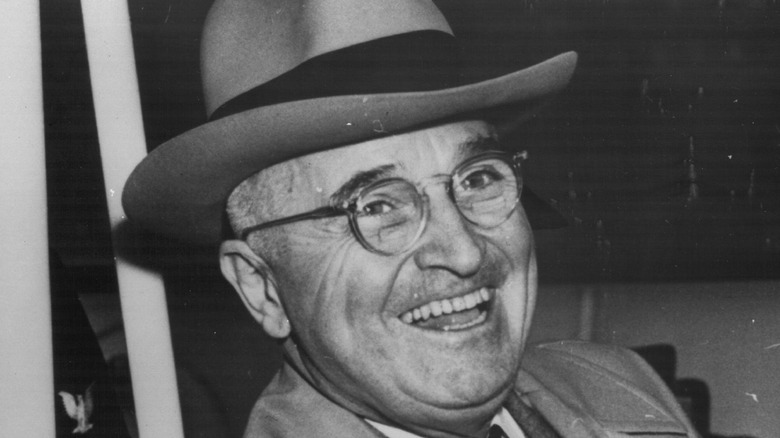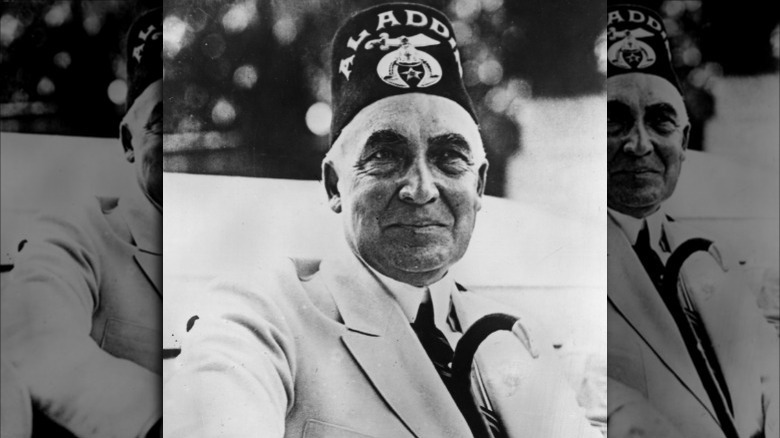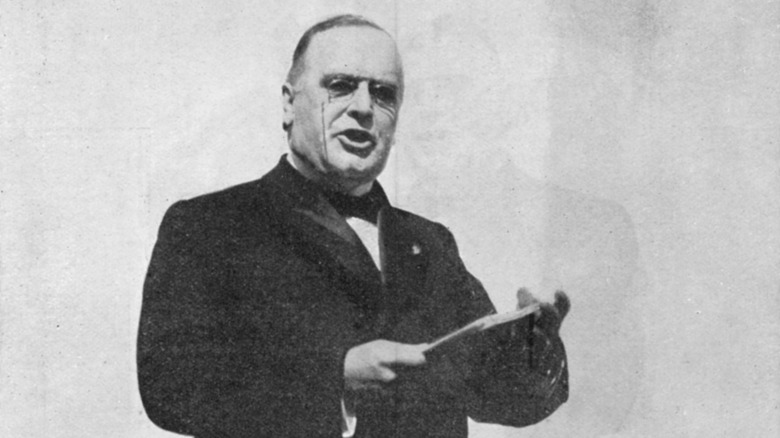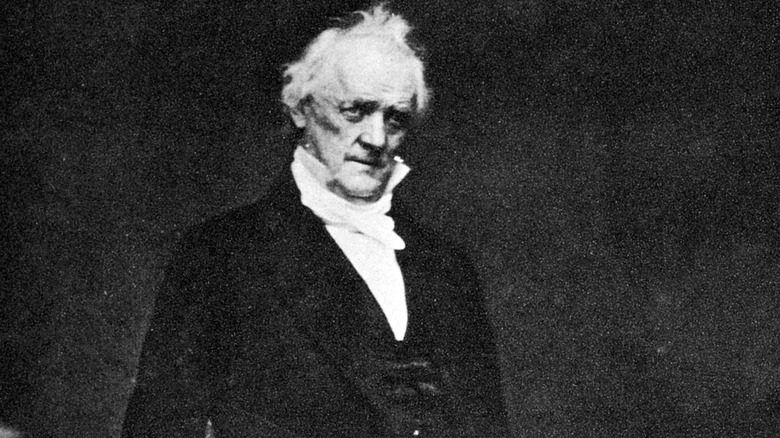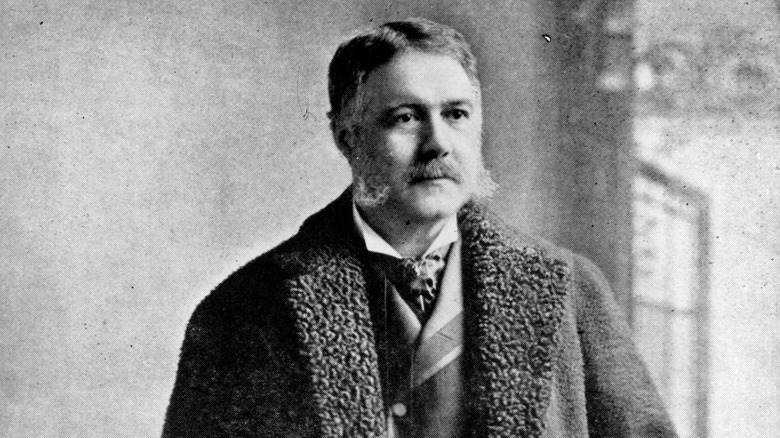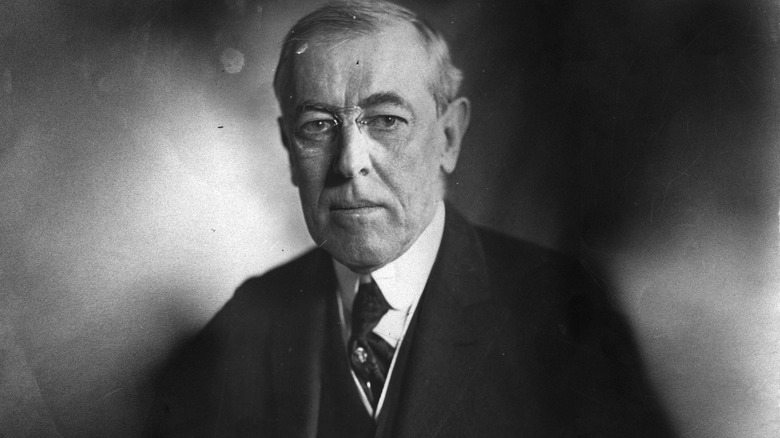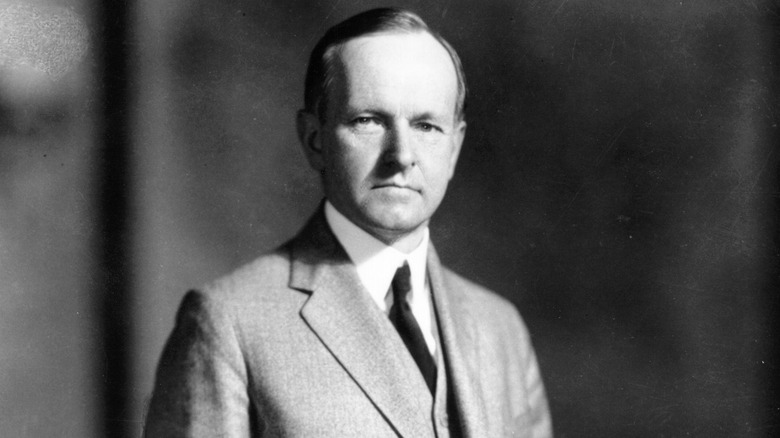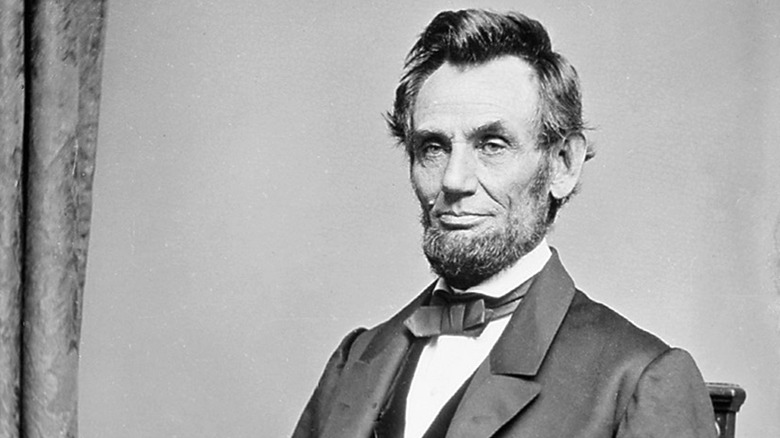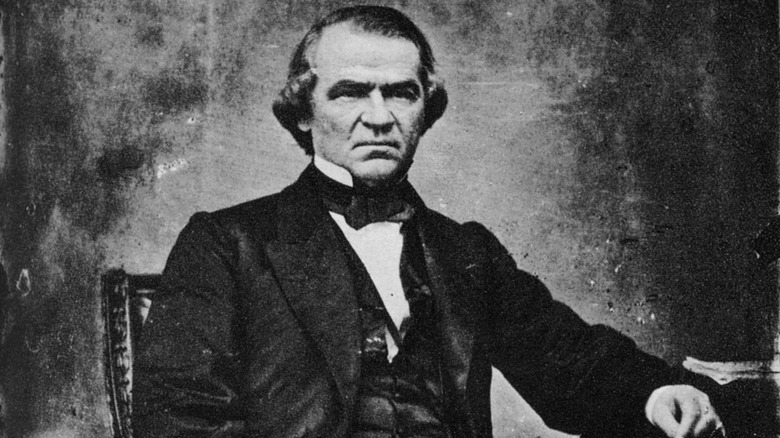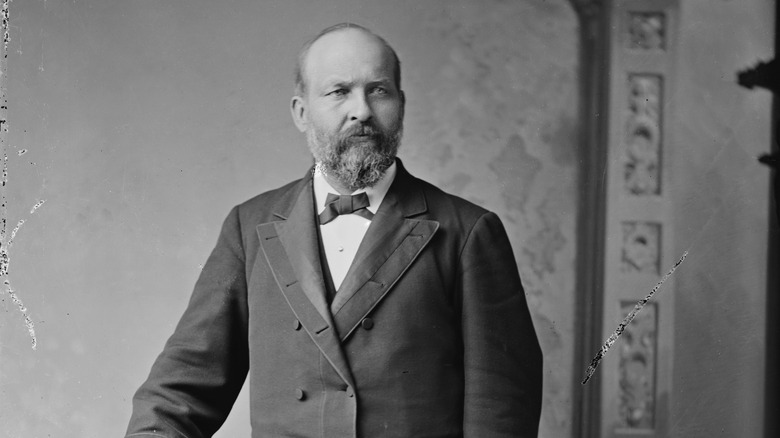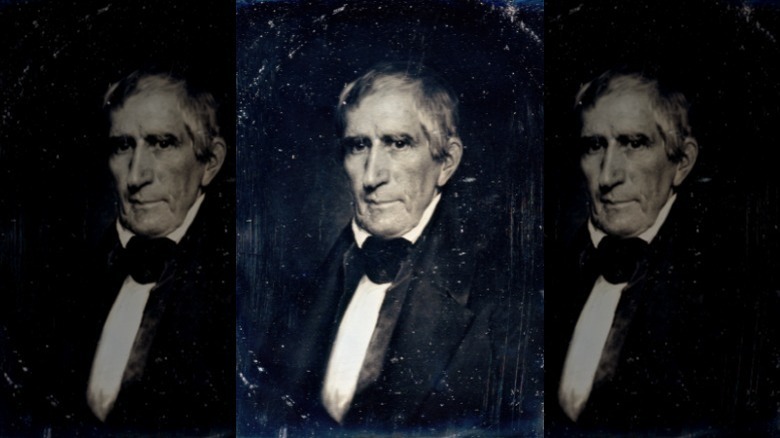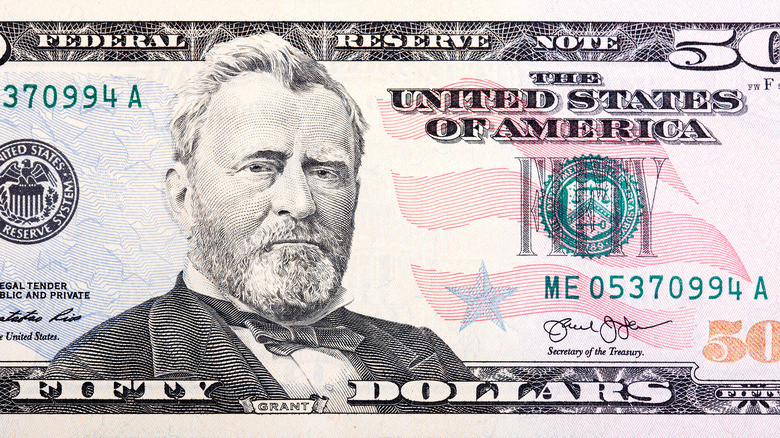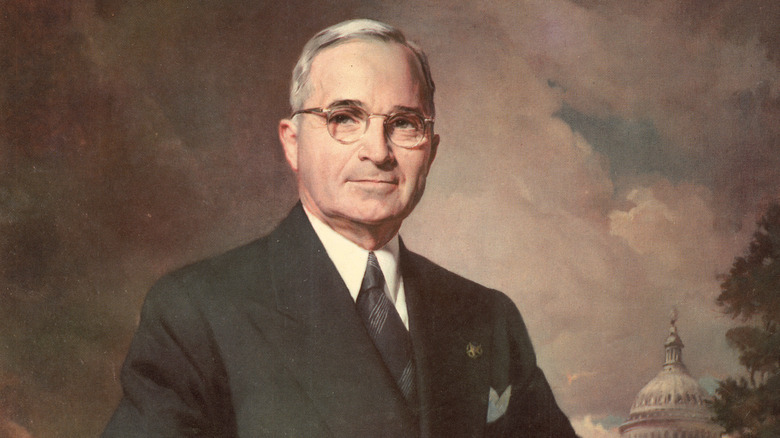Presidents Who Were Poorer Than You Thought
It's generally accepted that in order to become the leader of the free world, you have to be pretty wealthy. Americans still cling to the mistaken belief that there's a high degree of social mobility in this country — despite plenty of evidence to the contrary — but most also understand that in order to become president of the United States, you need to be able to campaign without working a day job and be able to afford some hefty bills. As a result, there's about zero surprise at the fact that the vast majority of U.S. presidents were millionaires at the bare minimum.
That doesn't mean they were all equally rich — there's actually quite a spectrum when it comes to the wealth of presidents. And a few presidents were actually remarkably poor, though most of the more modest presidents held office a long time ago. In the modern day, the presidency is often the gateway to wealth: According to Yahoo!, for example, Bill Clinton left office in 2001 in a lot of debt, but parlayed his celebrity and access into a multi-million dollar net worth just a few years later.
Not all presidents were so lucky. While the politicians on this list might be considered rich when compared to ordinary Americans, when compared to their fellow residents of the White House, they're definitely the poor relations. Here are the presidents who were poorer than you thought.
Warren G. Harding. Net worth: About $1 million
Warren G. Harding entered the White House just as the Roaring Twenties were getting into swing in 1921. He campaigned on returning "normalcy" to the country after the tumultuous years of World War I. According to The Miller Center, Harding's political career was mediocre — he was known as a "good fellow," which meant he never bucked his party and went along to get along. He missed plenty of votes to spare himself from having to take a position, and that complete lack of distinction made him the most acceptable choice for the Republican nomination in 1920.
Once in office, of course, Harding presided over one of the most corrupt administrations in the country's history (per Britannica). Harding only escaped having to deal with the negative publicity by wisely dying of a heart attack in 1923.
Harding was never directly implicated in the criminality, which is a little surprising because he wasn't exactly Bill Gates — his peak net worth was only about $1 million in today's money, and a lot of that came from his wife. According to USA Today, Florence Harding, five years older than Harding, came from money and had better business sense than her husband. Florence managed his businesses and helped make them successful.
William McKinley. Net worth: About $1 million
The 25th president was a small town boy — USA Today reports he had "no significant inheritance" — who grew up to become a lawyer and a lifelong public servant. After serving in the army during the Civil War, McKinley launched his political career in 1869 when he was 27 years old, according to The Miller Center. He spent most of the rest of his life in public service, which explains why he never became particularly wealthy.
The other reason he wasn't very rich was a combination of bad decisions and bad luck. After failing to secure re-election to the House of Representatives in 1890, McKinley recovered by getting elected Governor of Ohio. He also co-signed a large loan for a friend of his. When the economic crisis of 1893 hit the country, his friend defaulted on the loan — and sent McKinley into bankruptcy while he was governor, as noted by Business Insider. He asked some friends to help him sell assets, but instead they raised money on his behalf.
That misfortune burnished his everyman cred and made him even more popular — he easily won re-election as governor in 1894, and was elected to the presidency in 1896. He was solvent and comfortable again by the time he won re-election in 1900 — only to be assassinated in 1901, a few months into his second term, as noted by History.
James Buchanan. Net worth: Less than $1 million
Our only bachelor president, James Buchanan has shouldered a lot of blame for the outbreak of the Civil War, according to Britannica, as preventing such a conflict was his main priority upon election. Buchanan proved to be disastrously bad at preventing civil wars, however.
As noted by USA Today, Buchanan was born into a fairly modest family — he was, in fact, born in a log cabin. According to The Miller Center, his father was a successful businessman but not exactly wealthy. Buchanan himself became a lawyer — and a pretty good one, amassing a respectable fortune by the time he was 30 years old. That fortune wasn't respectable enough for the family of his great love, Anne C. Coleman. The Coleman family accused Buchanan of pursuing her for her money, and when she tragically died young, they barred Buchanan from the funeral. Buchanan never got involved with anyone romantically ever again.
A lifetime of public service while doing some lawyering on the side didn't make Buchanan rich, and while he was never broke, he never attained the status of millionaire — possibly because he was widely ridiculed and blamed for his handling of the crises that blossomed into the Civil War. He also published a book defending his actions, according to The Miller Center — but it sold poorly, and he died a recluse in 1868.
Chester Alan Arthur. Net worth: Less than $1 million
Chester Arthur was never elected president; he became president when James Garfield was assassinated as noted by Britannica. While Arthur never became fabulously wealthy, he made a very comfortable living as a lawyer and then as a rising star in the Republican Party of New York. According to The Miller Center, by 1870, Arthur was earning about $10,000 a year as chief counsel to the New York City Tax Commission — which would be about $212,000 today.
Arthur knew how to live well beyond his means, though. While serving as collector of the New York Customs House, Arthur presided over an incredibly corrupt system. There's no evidence that Arthur ever personally did anything illegal, but as reported by Politico, his reputation wasn't great as a result of his tolerance of such a crooked system. And although Arthur surprised everyone by working hard to completely dismantle the very corruption that had made him politically, he also wasn't shy about using his position: According to Investopedia, Arthur requested and received $30,000 from Congress to hire Louis Comfort Tiffany to decorate the White House for him.
Arthur never got rich, though. According to The New York Times, Arthur was diagnosed with Bright's disease in 1882 and kept his illness secret. His illness kept him from doing much after leaving office, and he passed away in 1886 a modestly well-off man.
Woodrow Wilson. Net worth: Less than $1 million
Woodrow Wilson is the only Ph.D. to ever serve as our president. As noted by Investopedia, Wilson's focus on education as a career prior to his entry into politics more or less guaranteed he would not be particularly rich. The son of a small-town minister, Wilson worked as a lawyer for a while, then taught at Princeton where he earned the equivalent of about $187,000 in today's money — which is a great annual salary, but not millionaire-level money.
The Miller Center reports that Wilson soon became the first president of Princeton University who hadn't trained as a clergyman, and he immediately set about reforming the school into a modern institution. But Wilson was a man who didn't care about money or academics — he very badly wanted political power. When the Democratic Party needed an ostensibly honest but easily-controlled candidate for New Jersey governor in 1910, they thought Wilson would be ideal. He won easily, and he proved to be so dynamic and independent that his momentum carried him into the White House in 1912, where he earned $75,000 a year according to Fox Business.
Wilson's salary history paints a picture of a comfortably well-off man, but not a wealthy one. Wilson left office in 1921 just as the Roaring Twenties were taking off, but he wasn't able to capitalize on the booming economy. After having a stroke while still in office, he passed away in 1924 at the age of 67, per History.
Calvin Coolidge. Net worth: Less then $1 million
Calvin Coolidge was chosen by Warren G. Harding to be his vice president in 1920 — and then unexpectedly became president when Harding passed away in 1923, as noted by Britannica. According to Investopedia, Coolidge quickly became known as a pro-business chief executive — as noted by History Central, his most famous quote is "The business of America is business."
But Coolidge was not a wealthy man. His father managed a general store, and Coolidge himself ran a small law practice until he was nearly 30, carving out a solid but unremarkable career. In 1900, he began his political career when he was appointed Northampton city solicitor — two decades later, he would be in the White House. But politics doesn't necessarily pay well — Coolidge was paid $75,000 a year as president, according to Fox Business.
USA Today notes that most of Coolidge's net worth actually stemmed from his property in Massachusetts, a house called The Beeches, as well as an advance he received for his autobiography after he left office. But Coolidge still had to work for a living, writing a newspaper column until the day he died of a heart attack in 1933.
Abraham Lincoln. Net worth: $150,000
The 16th president was decidedly not rich. USA Today notes that his estimated peak net worth is less than $1 million — in fact, according to PennLive when Lincoln died in 1865, he was worth about $150,000, plus or minus some small bits of property.
Lincoln was famously born in a log cabin and self-educated as a lawyer, but he wasn't a great businessman — or a great judge of character. As reported by The New York Times, Lincoln and a business partner bought a general store in 1832 in New Salem, Illinois. Using a line of credit, they bought up the inventory of some nearby stores in order to launch the business. They couldn't make the store profitable, and Lincoln sold his share in the business. But according to author James M. McPherson in his book "Abraham Lincoln," Lincoln's partner "drank up all the profits" and died. This left Lincoln liable for $1,000 in debt for the store.
Lincoln was sued and lost everything — even his horse. The disaster left Lincoln in deep debt for the next decade. He was able to stave off total poverty by working as a lawyer, but whatever chances Honest Abe ever had of becoming wealthy were gone.
Andrew Johnson. Net worth: Not much
One of the least-popular presidents, Johnson was a rough guy from a poor background who only became president when Abraham Lincoln was assassinated. According to The Miller Center, Johnson was born to poor, illiterate parents in North Carolina, and he didn't learn to read himself until his late teens. His father died when he was 3, and his mother had to work to support the family, according to USA Today. When he was 14, his parents set him up with an apprenticeship to a tailor, but Johnson ran away from home after a few years. When he returned, he worked as a tailor and taught himself to read and write a little.
What saved Johnson from a life of poverty was his wife: According to Britannica, Eliza Johnson encouraged Andrew to continue his education (and helped improve his literacy skills), helped him run his own tailoring business, and supported his move into politics. Suddenly, Johnson's humble beginnings and truculent personality became assets: USA Today notes that he was a passionate debater and supporter of the common man over the rich. He rose steadily through the political ranks: first an alderman, than mayor of Greeneville, Tennessee, and later as governor of that state.
By the time Johnson was elected to the U.S. Senate in 1856, he could be described as having "achieved a measure of prosperity" according to Britannica, which is another way of saying "not a millionaire."
James Garfield. Net worth: Not much
According to Investor's Business Daily, James Garfield may have been the poorest man to ever get elected president, and he is often called the "last of our log-cabin presidents." Unlike some, Garfield despised his poverty, saying, "To some men, the fact they came up from poverty is a matter of pride. I lament it sorely."
For a man who hated being poor (and who had to work as a carpenter and janitor to pay for college, according to Investopedia), Garfield made some curious life choices. According to USA Today, after graduating from college he worked as a teacher of Greek and Latin and later became a minister, not exactly career tracks known for minting millionaires. He did achieve success in his chosen field, however — PennLive notes he became president of Hiram College.
His political career was incredibly successful — he served nine terms as a congressman, and the job paid pretty well (between $5,000 and $7,500 a year, or somewhere around $112,000 to $168,000 in today's money). And getting elected president wasn't bad either, as the job had recently seen a pay raise to $50,000 a year (per Fox Business). But Garfield never had the chance to pursue wealth — as reported by History, he was assassinated by a deranged man just a few months after taking office.
William Henry Harrison. Net worth: Almost zero
William Henry Harrison, the ninth president, has the distinction of serving the least amount of time in the job: He died of pneumonia just a month into his term in 1841. A military hero, History reports that Harrison was elected to the presidency when he was 68 years old and made the dubious decision to go without a hat or coat at his inauguration, which was frigidly cold. It proved too much for the old man.
Although USA Today notes that Harrison's peak net worth was in excess of $6 million, he died virtually penniless. As noted by The Miller Center, as the youngest of seven children, Harrison didn't get much of an inheritance. He did receive about 3,000 acres of good farm land from his father, but as noted by Business Insider, he was appointed ambassador to Colombia in 1829, which forced him to manage the farm from a distance. Bad weather ruined him, and he had to sell everything to his brother — and his sons also racked up considerable debts, which he attempted to pay.
The result was a man who was still heavily in debt by the time he became president. Who knows what might have happened if he'd lived to serve his full term, but it was a deep hole: Congress even had to create a special pension for his wife to ensure she didn't starve to death, granting her $25,000 and free postage for life.
Ulysses S. Grant. Net worth: Flat broke
The 18th president was a military genius but pretty hopeless when it came to every other aspect of life. As noted by author Ron Chernow in his book "Grant," the future general and president washed out of the army due to his drinking a decade before the Civil War, and according to PBS, he struggled financially his whole life, often begging his hated father-in-law for loans and jobs to get by. In fact, being flat broke is pretty much the defining characteristic of Ulysses Grant when he wasn't actively leading an army in the field.
History reports that things went quickly downhill for the financially-challenged war hero after his two terms as president. In 1884, the investment firm he'd built with a man named Ferdinand Ward was revealed to be something of a pyramid scheme. Grant was a wealthy man on paper, but it all vanished in the blink of an eye. At one point, Grant's net worth was about $210.
The rest of Grant's life was a scramble for money. This only intensified when he was diagnosed with throat and tongue cancer, according to CBS News. Desperate not to leave his family destitute, he agreed to write his memoirs for the huge advance of $50,000 and a sweetheart royalty rate of 75%. Working night and day, he managed to turn out 10,000 words per day before he died less than a year later.
Harry Truman. Net worth: Unclear
Harry Truman is usually included on lists of the poorest U.S. presidents. As noted by Investopedia, Truman struggled financially for most of his life. He worked as a farmer before serving in the military, and then he opened a men's clothing store that failed disastrously, almost pushing Truman into bankruptcy. And USA Today notes that Truman's poverty while serving as president moved Congress to approve a raise, bringing the president's salary to $100,000 (per Fox Business). And PennLive notes that he was the first president to receive a pension — and the first to sign up for Medicare.
But Truman may have been richer than we think. First of all, he sold the rights to his memoirs for $600,000, which would be more than $6 million in today's money. In fact, according to The Boston Globe, Truman actively deceived Congress about his finances in order to get his pension — and Truman's own will drafted in 1953 showed a net worth of nearly $7 million in today's money. By 1959, that had grown to $9.7 million.
Does that mean that one of America's most beloved presidents conned the United States out of significant money? Maybe. Either way, Harry Truman was either broke as a joke or modestly wealthy depending on what evidence you look at.
